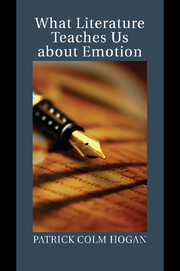Book contents
- Frontmatter
- Contents
- List of Figures
- Acknowledgments
- Introduction: Studying Literature Studying Emotion
- 1 Fictions and Feelings
- 2 What Emotions Are
- 3 Romantic Love
- 4 Grief
- 5 Mirth
- 6 Guilt, Shame, Jealousy
- 7 From Attachment to Ethical Feeling
- 8 Compassion and Pity
- Afterword: Studying Literature Shaping Emotion
- Works Cited
- Index
- Title in the series
7 - From Attachment to Ethical Feeling
Rabindranath Tagore and Measure for Measure
Published online by Cambridge University Press: 03 May 2011
- Frontmatter
- Contents
- List of Figures
- Acknowledgments
- Introduction: Studying Literature Studying Emotion
- 1 Fictions and Feelings
- 2 What Emotions Are
- 3 Romantic Love
- 4 Grief
- 5 Mirth
- 6 Guilt, Shame, Jealousy
- 7 From Attachment to Ethical Feeling
- 8 Compassion and Pity
- Afterword: Studying Literature Shaping Emotion
- Works Cited
- Index
- Title in the series
Summary
The Morality of Leaving Home
In his 1894 collection, Sonar Tari, Rabindranath Tagore has a poem about leaving home. The speaker – whom I take to be roughly equivalent to the poet – is working at a distance from his family and has returned for religious holidays. Now it is time to leave. There is great frenzy in the home. Servants rush about bearing great loads for the journey. The poet's wife seems to pack everything in sight until the stack of goods towers over the helpless writer who pleads for some restraint. Just outside this bustling throng is a four-year-old girl, the poet's daughter, who sits teary-eyed, guarding the door. When, at last, he approaches to leave, she announces, “I won't let you go.” But, of course, he goes anyway; the separation is inevitable. As he passes along the road toward his destination, everything he sees reminds him of his daughter; in every sound, he hears the words of the little girl, heartbroken by the door. “From all directions today,” he reports, “that sad heart-rending wail reaches my ears,/ringing without pause, and in my daughter's voice” (85).
There are many ways we could approach this poem. The most obvious is metaphysical, the Vedāntic interpretation according to which all the material world is change, and change is the source of suffering.
- Type
- Chapter
- Information
- What Literature Teaches Us about Emotion , pp. 221 - 256Publisher: Cambridge University PressPrint publication year: 2011



